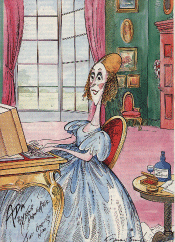|
More to the point, perhaps, is whether she understood much math.
She wasn't a math whiz, Holt makes clear. She was the daughter of a poet
with celebrity status who worked hard to bridge what C.P.
Snow would later identify as a chasm between two cultures: the humanities
and the math-sciences. In her writings, she worked the shuttle-cock between
these two worlds, weaving a seamless tapestry (never finished), thereby
exciting a lay audience about the possibility of computers, while likewise
addressing some of the philosophical questions that would surely occur
in the everyday mind: could these machines really think, become intelligent
creatures eventually?
Holt considers her answer to the above question
("no") rather facile, saying she neglected to consider how
stored-program computers could rewrite their own programs and
therefore get out from under their human Frankenstein-creators to
some degree, and beat them at chess. This somewhat betrays
Holt’s own naiveté I think. Deep Blue relied a lot on
brute force, advances in hardware that made the same algorithms
execute much faster. Deep Blue was not some breakthrough in
self-modifying neural nets, and to this day you can fool a
chess-playing computer with chess situations a child (not a
prodigy) wouldn't bungle.
Sir Roger Penrose brings up such
chess cases when describing the space of non-computable problems, where
the human mind seems to venture and shine in ways that no rule-following
artificial intelligence (self-modifying or not) has ever managed. Whether
or not Penrose is correct regarding his version of "no" to the same question,
the point is this is not a closed issue, settled long ago in the
minds of all trully well-informed thinkers. Ada's position is still tenable.
Does a person need to be a math whiz to be the first computer
programmer? By Holt's own argument, if we take the title from Ada, we
should bestow it on that French programmable-loom guy. The loom was for
weaving fabrics, not for computing Bernoulli numbers or navigation tables.
There's no mention of how much calculus went into this loom design --
also no mention, while we're on the subject of the computer's forebearers,
of programmable musical instruments (like player pianos and such). Anyway,
by Holt's own criteria, the answer is clearly "no, you don't have to be
a math whiz," as his own candidate for first computer programmer wasn't
either (or even if he was, this isn't documented nor is this proferred
as relevant to his case).
Ada's chief sin, and why she's so undeserving of the title
apparently, is not that she failed to demonstrate a high level of math
skill, but that she seemed to think herself some kind of genius -- this
is what's so irritating (to her mother certainly). Her sin was pride,
hubris, fancying herself the equal of her betters, even when she clearly
had a weak grasp on the cosine function. The purpose of this New Yorker
review is to put this upstart tart in her place, to take back this recognition
and title as from an unworthy, a pretender, an imposter. That so many
websites celebrate her contribution
to the literature is regarded askance, as a scam perpetrated by know-nothing
New Agey types who likewise celebrate crop circles, healing crystals and
feminist causes (that was my impression anyway -- perhaps I'm projecting).
But what Ada did is what Babbage wanted her to do (by
Holt's own analysis) which is to make the vision of the Analytical Engine
compelling and "the talk of the town" in liberal-minded, high
society circles. To accomplish this, she needed enough credibility with
the literati to appear well-informed, and she got this by doing her homework,
learning enough about the Analytical Engine and how it worked on paper
to attempt a program. True, she got bogged down in the details of how
to break down the Bernoulli Number
calcs into smaller steps, and Babbage helped her with the algebra. She
wasn't a math whiz, we've already discovered.
Ada was inspired by the Babbage engine and what
it might portend. She wrapped a lifeless machine (or paper
blueprints for same -- it was never actually built) in a mix of
fantasy, numbers and charts, and breathed life into it, by creating
a blend of science fiction and metaphysics that was credible both
to her readers and to herself. Disbelief was suspended and
dispelled, such that to this day we remember Ada and her antics,
and the impact she made on the thinking of her day. She
wasn’t trying to hoodwink her audience. The exercise with the
Bernoulli Numbers is proof of her integrity -- she struggled to
comprehend the Analytical Engine for exactly what it was, even as
she speculated about the future.
Ada got out on stage and played the attractive young daughter
of a romantic poet (which she was), imbued with dawning comprehension
of times ahead (which she had). In so doing, she did what many poets have
done: used her intuition (perhaps at times opium-enhanced - tsk) and creative
writing skills to anticipate TomorrowLand. True, Babbage wasn't suddenly
awash in funding as a result, but wheels of this magnitude turn slowly,
as many a poet-futurist has found out. So we might argue that Ada was merely the first popularizer
of computer programming, a celebrity who brought attention to a nascent
discipline in ways a more stodgey gentleman never could. But to be a "first
popularizer" of something that doesn't really exist yet in the public
mind is to achieve more of a breakthrough than simply popularizing. And
she not only popularized the idea of programming, but she anticipated
the genre of speculative literature that would grow up around it, a combination
of science fiction laced with philosophy. And in so doing, she projected
an image of her persona, as a kind of genius and enchantress, adding color
and imagination to what had hitherto been colorless and dryly empirical.
It's no accident, then, that the "myth of Ada" is still
around to be debunked to this day. She set her name on a trajectory, which
has only succeeded in gathering momentum over time. Again, this is something
poets are oft times good at, and it's a testament to the power of their
magic when they manage to make a lasting imprint without indulging in
carnage or increasing the need for new war memorials. Of course sometimes
a magnum opus sets in motion, deliberately or inadvertently, a chain reaction
with diabolical consequences. Ada, though, seems to have had a largely
benign influence, and those who worship in her temple don't seem especially
prone to violence or mayhem -- given the number of personality cults which
are, that's another point in her favor.
So I, for one, am in favor keeping the title of "first
computer programmer" right where it belongs, with Ada, because when
she jumped so willfully into the deep end, she made an excellent splash
with lasting precessional effects. In giving her the title, you might
say I'm taking a rather light-hearted approach to the game of "me first"
(of priority), which men especially seem anxious to play with grim and
loveless fascination. Giving the title to someone as clearly "unmeritorious"
(as the jealous zealots might see it) seems to detract from the deadly
seriousness of the entire enterprise, turning the earnest business of
proving priority into marketing, show business, a dramatic production,
a circus, a game touched by comedy, caprice and hype. Yep, that's the
spirit. It's a casting decision, and in my judgement this Ada Byron character
has done a creditable job, and should keep developing in this role. It's
her niche and she's earned it. Others may (and do) disagree, but I'm unmoved
to alter my aesthetic judgement at this time.
I also think that articles such as this in The
New Yorker, aimed at cutting her off at this late date from her
rightful inheritance, provide all the more reason to keep her
entrenched right where she is. Thank you Ada Byron, and may you
live long and prosper in our shared memory.

A draft version of this
article first appeard at the Swarthmore Math Forum on March 6,
2001
Synergetics on the
Web
maintained by Kirby Urner
|

